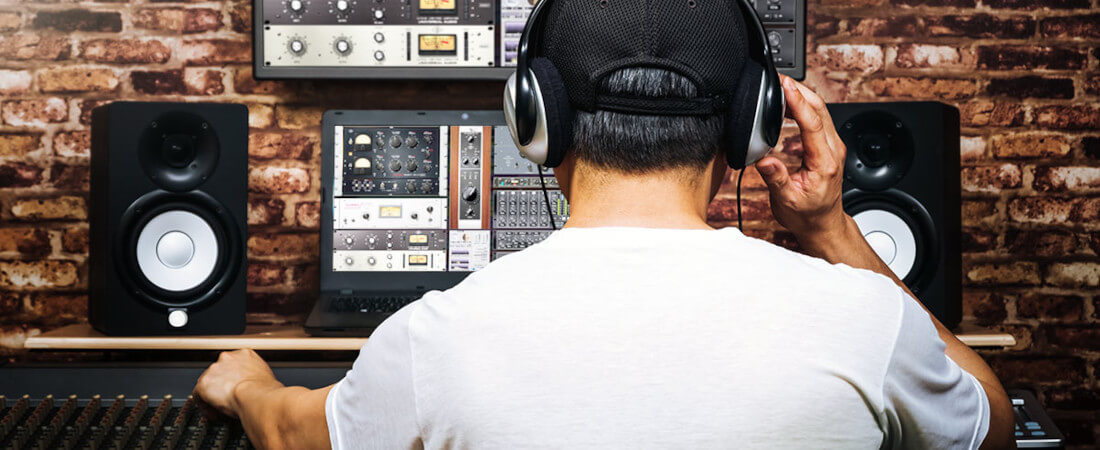PRODUCTION TIPS
The main goal of music production is to create a polished and professional recording that effectively captures the artist’s vision and connects with the audience. It involves a combination of technical and creative processes to enhance the quality, clarity, and impact of the music. The production aims to bring out the best performances from the musicians, utilizing techniques such as recording, mixing, and mastering to achieve a cohesive and balanced sound. Ultimately, the goal is to produce a final product that resonates emotionally with listeners and showcases the artistic expression and talent of the musicians involved.
Music Production Stages
Music production encompasses several important stages that contribute to the creation of a high-quality and impactful recording. The most crucial stages include:
-
Pre-production: This initial stage involves planning and preparation. It includes activities such as songwriting, arranging, and selecting the right instrumentation, as well as prepping the recording environment and equipment. Pre-production allows for refining ideas, organizing the structure of the songs, and establishing a clear direction for the production process.
-
Recording: The recording stage involves capturing the performances of the musicians and artists. This can include tracking instruments, vocals, and other audio elements. It is essential to ensure proper microphone placement, sound isolation, and capturing clean, high-quality audio signals during this stage.
-
Editing: After the recording, editing is performed to refine and enhance the recorded material. This includes tasks like comping (selecting the best sections from multiple takes), time-aligning tracks, fixing pitch issues, and removing any unwanted noises or mistakes. Editing helps to create a seamless and polished performance.
-
Mixing: Mixing is the process of balancing and blending individual tracks to create a cohesive and pleasing final mix. It involves adjusting levels, panning, applying equalization, dynamics processing, and adding effects such as reverb or delay. The mix stage focuses on creating depth, clarity, and an overall sonic balance that highlights the various elements of the music.
-
Mastering: The final stage is mastering, where the overall sonic quality and consistency of the entire album or track are refined. It involves processing the stereo mix, optimizing its loudness, and applying final touches to ensure compatibility across different playback systems. Mastering also involves sequencing tracks, adding fades, and creating a final product ready for distribution.
Each of these stages plays a crucial role in the music production process, contributing to the creation of a professional and impactful recording.
Music production for movies and for music artists difference
Music production for movies and music artists differ in their objectives, processes, and considerations.
Music Production for Movies:
- Objective: In film music production, the primary goal is to create music that complements and enhances the visual storytelling of the film. The music serves as a supporting element, helping to convey emotions, build tension, or establish the film’s atmosphere.
- Collaboration: Film music production often involves collaboration between the composer, director, and other members of the film production team. The composer works closely with the director to understand their vision and align the music with the overall narrative and pacing of the film.
- Synchronization: Film music must be synchronized precisely with the on-screen action. It needs to match specific cues, dialogues, or visual events in the film. The timing and placement of the music are crucial to create a seamless integration between the audio and visual elements.
- Adaptation: Film music production often requires the ability to adapt and work within specific guidelines or restrictions. The composer may need to compose music that fits certain time constraints, follow a particular genre or style, or incorporate specific thematic elements to support the film’s narrative.
Music Production for Music Artists:
- Artistic Expression: Music production for artists focuses on realizing their creative vision and showcasing their unique style and identity. The goal is to create a recording that captures the essence of the artist’s music and connects with their audience.
- Song Arrangement: The producer collaborates with the artist to develop and arrange the songs, determining the structure, instrumentation, and dynamics that best serve the artist’s artistic direction. They work to create a coherent and engaging musical experience.
- Individuality: Music production for artists aims to highlight the artist’s individuality and signature sound. The producer may experiment with different sonic elements, textures, and production techniques to create a distinct and recognizable sonic identity.
- Commercial Viability: While artistic expression is important, music production for artists also considers commercial viability. The producer may work on refining the songs and arrangements to ensure they have mass appeal and can resonate with a wider audience.
Both film music production and music production for artists involve technical expertise and creativity. However, the focus and objectives differ, with film music production emphasizing supporting the visual storytelling of a film, while music production for artists centers on capturing the artist’s unique musical identity and connecting with listeners.
Frequently asked questions
Q: Do I need a music degree to become a successful music producer?
A: No, you do not necessarily need a university degree to become a music producer. While formal education can provide valuable knowledge and skills, the music industry primarily values talent, creativity, and hands-on experience. Many successful music producers have developed their skills through self-study, practical experience, and networking within the industry. It is essential to gain a deep understanding of music production techniques, utilize modern technology, and build a strong portfolio of your work to showcase your abilities. Continuous learning, networking, and staying up-to-date with industry trends can significantly contribute to a successful career as a music producer, regardless of having a university degree.
Q: Do I need to know to play an instrument to become a music producer?
A: Knowing how to play an instrument can be helpful for a music producer, but it is not essential. Playing an instrument aids in understanding melody, harmony, and composition. It allows for recording parts oneself and effective communication with musicians. However, many successful producers excel in other production aspects without playing an instrument. Ultimately, creativity, technical skills, and knowledge of production techniques are crucial for a music producer.
However, it can still be beneficial to have a general understanding of mixing concepts and terminology. This allows for effective communication with the mixing engineer and ensures that your creative vision is effectively translated into the final mix. Being familiar with basic terms such as EQ, compression, panning, and effects can help you provide clearer instructions and feedback to the engineer.
Blog Articles
Mixing In Key Or Harmornic Mixing
Mixing in key refers to the practice of aligning the musical elements in a mix to ensure they are harmonically compatible. It involves considering the key or musical...
Using a reference track to improve your mixes
» Setting a benchmark » Developing a better ear » Improving your techniques » Avoid common mistakes Mixing is a complex process that involves balancing the different...
Using a limiter or clipper in music mixing and production
WHEN AND HOW TO USE A LIMITER MIXING MUSICAudio mixing and production involve a range of techniques and tools to shape the sound of a track. One essential tool in this...
Extras
Blog
Other News
Contact Page
About Us



